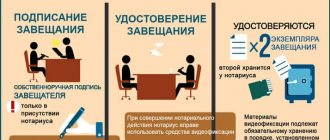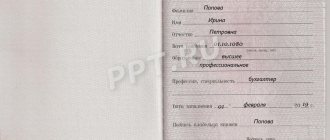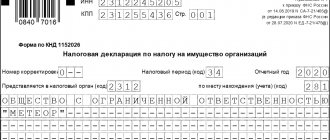What is a will
This document represents the last will of the deceased. In it, the testator indicates the names of those persons who should become his heirs and receive the remaining property. The law does not limit the choice of heirs exclusively to the community of relatives. These may also be people who have no family connection with the deceased. The testator can also make a will for property in one of the following ways:
- simply indicate the list of heirs in the body of the will, and then the inheritance will be divided equally between the mentioned persons;
- draw up the text of the will so that for each heir the amount of the share that the testator wants to give to him will be prescribed.
The document acquires full legal force only upon the death of the testator. The heirs, in turn, have the right to dispose of the received property only after 6 months from the date of the death of the testator. This period is also reserved for entering into inheritance rights, which recipients of the deceased’s property must register with a notary at the place of residence of the deceased.
Open form of testamentary act
Russian legislation provides for several types of administrative documents on the fate of the testator’s belongings. In terms of their legal force, they are not always equivalent. However, each of them is adapted to specific circumstances and can be chosen by the testator at will, with certain reservations.
An open will is also called a universal will.
The term openness in this case is considered relative. Such a will is available for review by witnesses, a notary, and executors. Other persons do not have the right to read the will if such an intention was expressed by the testator. Each participant in the document certification procedure must keep secret what is contained in it. Otherwise, they may be required to pay monetary compensation for moral damage caused.
Article 62 of the Civil Code acts as a guarantee of the legal significance of an open form. This provision can only be challenged in exceptional cases. Thanks to such a document, executed by a notary, it is possible to bequeath property of any type (except for those prohibited by law).
Closed form of will
A closed will is a similar type of act of will, but the difference lies only in the design features and the absolute confidentiality of the information contained in the document.
When the testator wants to hide his own orders from other persons before the inheritance opens, he needs to draw up a will in closed form. Also, this form of testamentary document is used if he has doubts about the observance of testamentary secrecy on the part of the notary and other participants in this process.
How to make a will for property correctly
Only a paper form of a will drawn up by the deceased can serve as the last will of the deceased. If when drawing up a will it is necessary that it not be challenged, then it is necessary to strictly follow the legal, factual and grammatical rules for drawing up the document. Then you will be able to compose it correctly and prevent objections from the rest of your relatives. What you need to pay attention to:
- dates;
- names of heirs;
- the location and name of the property that will be included in the inheritance and must entirely belong to the testator.
The writing of the document must be done either by the testator himself or by the person who will record his words and wishes. Only the testator can sign a will. Proxies are not permitted unless the testator is physically able to sign. In this case, the consent of the testator and a note about the participation of a third party during registration are required.
Challenging a will will only bear fruit if the document is executed incorrectly.
Rules for making a will
The provisions of Article 1131 of the Civil Code of the Russian Federation provide that a will for inheritance can be challenged in court.
This can be done if there is sufficient evidence. There are several reasons.
These include:
- the act was drawn up under the influence of threats or violence;
- Witnesses are persons who are not authorized to act in such a capacity. For example, when this role is performed by an interested person or an employee of a notary office who is incapacitated;
- the document was drawn up by a citizen between the ages of 14 and 18, provided that the legal representatives did not give their consent to this;
- the will was executed by a person who has lost partial or complete legal capacity;
- the subject is property, the disposal of which is limited;
- the person was not aware of the nature of his actions during the formation of the act.
If all the rules are taken into account when drawing up a document, it will not be possible to challenge it. When talking about how to write a will, it is important to note that it must be certified by an authorized body and reflect the date of preparation.
In addition, the document must contain the signatures of the testator and, if required, witnesses. The provisions reflected in the act cannot be in conflict with each other.
Where is a will written?
Drawing up a will requires a mandatory condition - certification by an authorized body. Most often, this is a notary office. In this case, the notary is responsible for certifying and storing the document.
In July 2014, changes were made to the Civil Code of the Russian Federation; from that moment on, the specified official is responsible for reflecting data on the drawn up act in a single database. This is necessary so that everyone who is interested in having a will can obtain information from the notary.
Only notary employees have access to such a resource. The notary is obliged to keep the content of the document secret.
Who else can certify a will?
Article 1127 of the Civil Code of the Russian Federation states that certification of a citizen’s last will can occur without a notary; a sample document must still be used.
This situation occurs when the testator is in:
- a special institution - for elderly citizens or those who have lost their ability to work;
- expeditions;
- long voyages;
- military unit, provided that there is no notary office nearby;
- prison
In this case, the procedure for drawing up provides that the right to certify the document is vested in persons managing the activities of the listed institutions or captains of ships, commanders of units.
Speaking about where to turn if a citizen is outside the country, you need to indicate that the only option is the consulate.
Legal capacity, sanity of the testator
Challenging a will is often based on procedural violations that run counter to §2 of Chapter 9 of the Civil Code of the Russian Federation. If there are any, the unilateral transaction of the testator is considered fictitious:
- When drawing up a will, the legal capacity of the testator was limited by a court decision, or he himself was incapacitated.
- The sanity of the testator is in question because he was under the influence of alcohol, drugs or psychotropic drugs prescribed due to mental disorders.
- The deceased decided to make a will for the property in favor of one of the heirs, since the latter promised him a number of benefits in return.
- The text of the will had to be drawn up in favor of one of the heirs under the influence of threats, pressure or deception. At the same time, the testator could not express his own will.
- Refutations have been found that the will was drawn up by the deceased independently. In particular, this applies to falsification of documents and signatures.
These tricks are most common if the testator wants to make a will for an apartment. Or if someone decided, for selfish purposes, through false means to draw up a will for a plot of land and a house in his own name.
Responsibility of the specialist
As the executor of the last will of the deceased person, witnesses, translator and other persons certifying the administrative act, the notary, until the opening of the inheritance case, has no right to disclose information about the execution and contents of the will. Such information can only be transmitted to the unified information system of the notary. Violation of the secrecy of a will leads to a demand for compensation for moral damage on the part of the client, who also has the right to use other methods of protecting civil rights.
After the death of the testator, the notary performs the following actions:
- registers and stores documentation received from heirs, as well as responses to requests and personally executed papers;
- sends out notifications about the opening of inheritance to the intended successors of the deceased;
- accepts documents confirming the death of the owner of an apartment or other property and the applicants’ rights to receive these assets;
- ensures the safety of the inheritance mass and manages the property;
- issues certificates of property rights and the allocation of shares in the total inheritance;
- provides other assistance to heirs in certifying their rights to the property of the deceased person.
On the day the inheritance is opened, the notary creates a folder in which he files official papers related to the progress of the case. Upon completion of the inheritance case, the total number of sheets, closing time, list of documentation and its storage period are written on the cover of the folder. At the same time, heirs are recommended to keep the will as proof of ownership even after inheriting property.
As for the cost of notary services, for the certification of wills and the acceptance of closed administrative papers, it is necessary to pay a state fee, the amount of which is 100 rubles. A fee of 300 rubles is charged for opening an envelope with a closed testamentary act and its readout. For the issuance of a certificate confirming the rights to ownership of the assets of the deceased, close relatives of the testator pay an amount equal to 0.3%, and third parties - 0.6% of the value of the inherited items.
Regardless of the form of expression of will, one copy is always kept by the notary. Before opening a probate case, the specialist does not have the right to disclose information about the execution and contents of the document, otherwise the secrecy of the will will be violated. If it is violated, the testator may demand compensation for moral damage and resort to other methods of protecting his rights.
How to make a strong will yourself
To be more confident that the will cannot be challenged, you should not only draw up the will yourself, but also take some measures to protect the document:
- Third Party Testimony . These people will be able to give their testimony in court during the proceedings in the future. To do this, the will must contain their data and signatures.
- Record the process of drawing up and certifying a will on video or audio , which will serve as additional evidence.
- Obtain certificates from the relevant institutions confirming the state of health and that the testator was in a sane and capable state.
- Pay close attention to documents for signing and the words of third parties.
If desired, you can use other methods. But they must be carried out strictly within the law and not violate the civil rights of the testator, heirs or third parties.
Key Aspects
A will is a citizen’s personal will regarding his property after death. According to the document, any persons can become recipients. Recipients not named in the will will not be able to accept the inheritance, even if they are legally entitled to do so, with the exception of those who can receive a compulsory share.
It is possible to challenge a will in court, but only if there are compelling reasons for doing so. A document can be declared void on the basis of gross errors in its preparation, violation of the order of execution, or unclear will of the testator.
Only legally capable adults can write a will for an inheritance. The document may contain the following conditions:
- List of heirs and inherited property, shares of each applicant.
- A list of unworthy recipients who will not be able to inherit even if they have such a right by law.
- Conditions for accepting inherited property, executor of the will.
Have you encountered difficulties when registering an inheritance and do not know how to solve them? Ask your question to our lawyer on the website and receive a detailed answer about your rights and options. Our consultation is fast and free.
Will for an apartment correct spelling
Regardless of whether the will is written for a share of an apartment or for an entire living space, among the heirs there may be persons who disagree with the distribution of property in accordance with the last will of the testator. And the Legislation lists the persons who have the exclusive and mandatory right to challenge the will for an apartment:
- adult disabled children;
- minor children;
- disabled parents or adoptive parents;
- disabled spouses;
- other types of dependents of the testator.
By law, they may not challenge the will for their share of the apartment, since they are entitled to a mandatory share of the inheritance . The latter is half of what they would have received if the property had been equally divided among all heirs. An heir under a will will be able to obtain full ownership of bequeathed real estate only if the obligatory heirs completely renounce their share in the inheritance.
The testator, in turn, must be the full owner of the bequeathed property. And as an alternative to a will, you can use a gift deed. The latter also allows for the condition that the recipient receive the real estate strictly after the death of the previous owner.
DOWNLOAD: Samples of wills for inheritance (different types).
Documentation
A will is a unilateral legal contract, so its drafting must be approached as responsibly as possible. When contacting a notary, prepare the following documents:
- Your passport.
- Title documents regarding bequeathed property.
- Passport details (preferably a photocopy of the document) of all heirs under the will.
All these documents are necessary to accurately draw up a will. It is necessary to indicate information about yourself, about the designated receivers, as well as about the inherited property.
Will made in emergency circumstances
Exceptions to the rule of taking into account wills drawn up in a notary's office are only certain cases in which it is physically impossible to draw up a notarial will. In such a situation, the role of a lawyer can be performed by:
- captain of a military unit or water vessel;
- the head physician of the correctional institution in which the punishment is carried out;
- the head physician of the medical institution, if the testator is sick, and other persons with sufficient authority;
- head of the bank, if funds are bequeathed.
In this case, the document is a will drawn up under emergency circumstances. also drawn up in case of an immediate threat to life, but for the full legal force of the paper, at least two witnesses will be required when drawing it up . If the danger was avoided, then after a month the document will be invalid.
What must be signed by a notary?
Any will can be certified. However, there are types of documents that must undergo the certification procedure.
A written will must be certified , since after this procedure it will have legal force. Otherwise, the written will you have drawn up without the corresponding act of certification will not have legal force, which means that 6 months after your death the will will not be executed.
Or, your words can be easily challenged. No one will protect your will from forgery. Remember this.
Without a notary
If you don’t want to deal with a notary’s office, you have the opportunity to draw up a will not with a lawyer, but yourself at home with several trusted persons. The latter will be able to further confirm the authenticity of the will. But this is a rather unreliable way of conveying the last will of the testator, since in this case the document will be much easier to challenge in court.
If there is no legal office in the locality where it would be safer and safer to draw up a will, then an alternative certification method is available.
Or maybe register “for whomever you want” today?
After the death of the testator, a will can only work in part or, in general, be challenged in court. The heirs by law try to invalidate the will for various reasons. And often they succeed. As a result, the fulfillment of the citizen’s will is violated, and the inheritance goes to the wrong person.
If you have the opportunity and desire to re-register an apartment, house, cottage or other property today, there will be no disputes over the will in the future. The will will become an unnecessary document. The property will go to the person you wanted to transfer it to. Such ways: donation, rent, purchase and sale.
What documents are needed to make a will, how much does the procedure cost?
If, nevertheless, the will is executed in a notary’s office, the testator will need to prepare a package of documents and certificates containing the following information:
- Personal information of the testator.
- Personal information of his heirs whom he intends to mention in the document.
- Confirmation of ownership rights to objects transferred by will.
Documentation will be required to include the most accurate information in the will, in the presence of which the last will of the testator cannot be annulled. The amount of the state duty is regulated by Article 22 of the Fundamentals of Notary Legislation.
Video: How to make a will correctly?
Deadlines for accepting an inheritance. Restoring deadlines. Actual acceptance.
Contact the notary. You need to take your passport and documents with you for the objects that you will bequeath. If you draw up a will with witnesses, they must also take a passport.
A will without a notary can only be issued in emergency situations: during natural disasters, illnesses, wars or from prison. True, the document still needs to be certified by one of these people:









